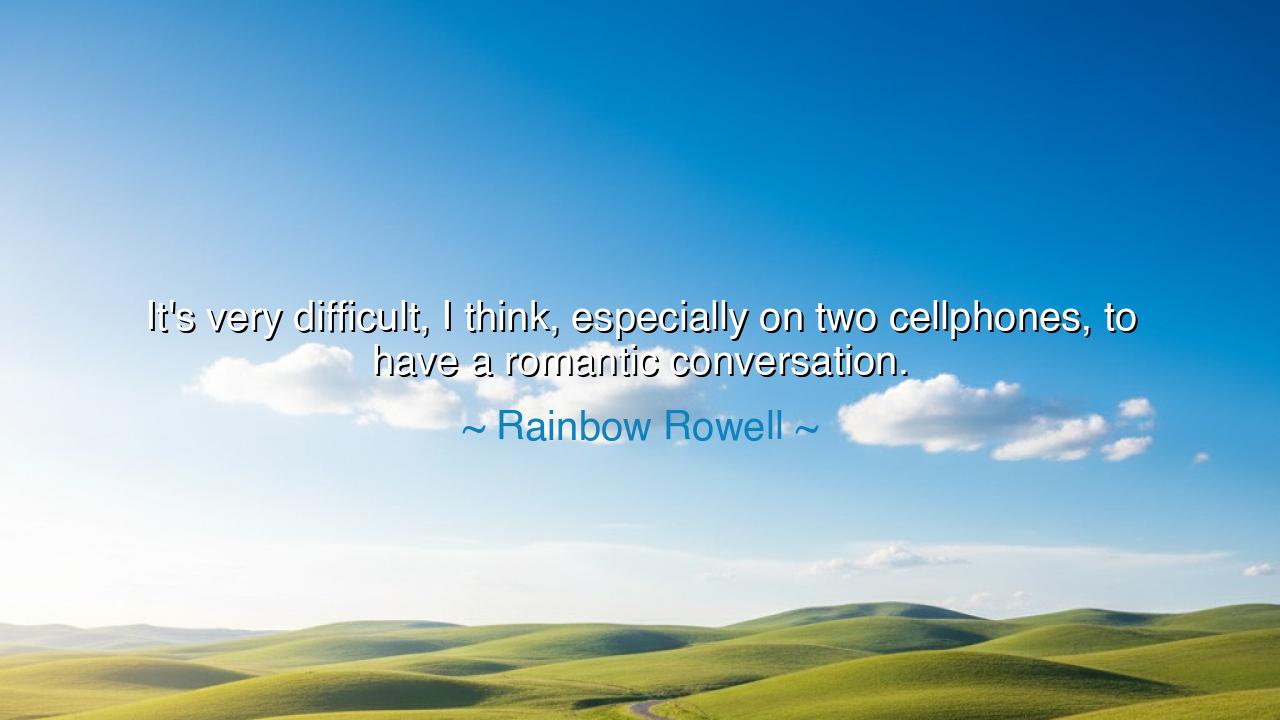
It's very difficult, I think, especially on two cellphones, to
It's very difficult, I think, especially on two cellphones, to have a romantic conversation.






"It's very difficult, I think, especially on two cellphones, to have a romantic conversation," says Rainbow Rowell, and in this simple statement lies a profound reflection on the nature of human connection in an age dominated by technology. The art of romantic conversation, once an intimate exchange of emotions and thoughts, has been altered by the rise of digital communication—quick, often impersonal, and distant. Rowell’s words point to a larger truth: that true connection, especially in matters of the heart, requires more than just words exchanged on electronic devices. It requires presence, vulnerability, and an emotional resonance that is often lost when we communicate through the cold, detached screen of a cellphone.
In ancient times, the conversation was the vessel for the deepest connections between people. In the Greek and Roman worlds, lovers often expressed their deepest feelings through letters—handwritten messages that carried not just the words, but the penmanship and emotion of the writer. The act of writing a letter was an intimate one, imbued with the power of the human touch, each stroke of the pen carrying the writer’s soul. Similarly, the spoken word in these times was considered a sacred exchange—dialogues between lovers, whether in person or in poetry, were seen as an art form. Sappho, the ancient poet, expressed love with words that transcended the moment, making her letters and songs resonate through the ages. A romantic conversation, in these times, was not simply the exchange of words, but an act of emotional alchemy, turning thoughts into something eternal.
In contrast, the world of today has digitized intimacy. While technology connects us across vast distances, it often distorts the depth of our communication. Rowell’s observation about the difficulty of having a romantic conversation on two cellphones speaks to this shift—how technology, for all its convenience, has also shrunken the emotional space that once existed between two people in love. There is a difference between talking face-to-face, where the gaze and body language carry meaning, and typing words on a screen, where tone and feeling can easily be misconstrued. The romantic exchange once full of warmth and subtlety is now often reduced to a few texted sentences, devoid of the richness that once came with voice, touch, and presence.
Consider the great lovers of history, such as Abelard and Heloise, whose letters have survived for centuries. Their written communication was filled with deep emotion, capturing the pain of separation, the longing of the heart, and the strength of their love. These letters are timeless because they were more than words—they were a testament to the depth of their relationship, a relationship that was not just intellectual, but profoundly romantic and spiritual. The distance between them, though physical, was bridged by the intimacy of their communication. Their letters were not just texts—they were emotional revelations, each word imbued with sincerity and desire. In contrast, a text message today can seem fleeting, a quick exchange that lacks the emotional weight that words once carried.
Rowell’s reflection also points to something deeper—connection is not only about the words we speak, but about the presence we give to one another. True intimacy requires more than the simple transfer of information—it requires an emotional investment. This is something that the ancients knew well: to truly know another person, to truly connect, one must be fully present. It is through attention, through listening, and through genuine exchange that we come to understand the heart of another. This is the foundation of romance—not in words alone, but in the quality of presence that is shared.
The lesson here is profound: we must not let technology rob us of the depth of human connection. While digital communication has its place, we must recognize its limitations when it comes to matters of the heart. Romantic conversations, at their core, are about more than just words—they are about presence, vulnerability, and the willingness to give of oneself fully. In the rush of daily life, it is easy to rely on texts and social media as shortcuts to communication, but we must remind ourselves of the power of the spoken word, of face-to-face interactions, and of the written letter that carries our soul along with it.
In our own lives, let us reclaim the art of the romantic conversation. Let us speak with intention and passion, whether in person or through the written word. Let us not be content with superficial exchanges, but seek to truly connect with those we love—through deep, meaningful conversation that transcends the quick convenience of technology. And when the distance between us and another person seems vast, let us not forget the timeless power of letters, handwritten notes, or even a heartfelt voice message. In doing so, we can rediscover the true power of connection—a connection that technology, for all its wonders, cannot replicate.






AAdministratorAdministrator
Welcome, honored guests. Please leave a comment, we will respond soon